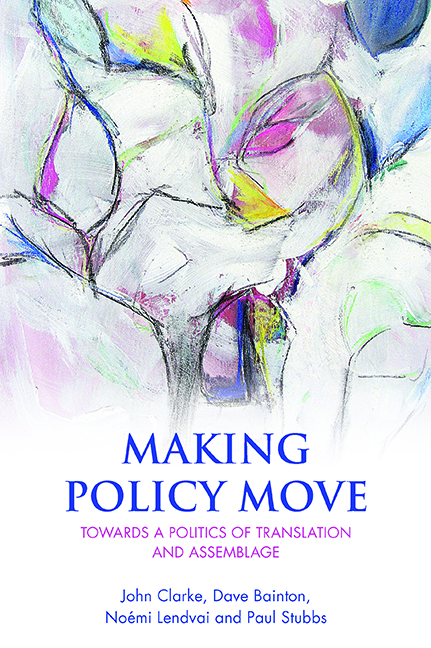Book contents
- Frontmatter
- Contents
- Introduction
- One Moving policy studies
- Two Translation, assemblage and beyond: towards a conceptual repertoire
- Three Performing reform in South East Europe: consultancy, translation and flexible agency
- Four The managerialised university: translating and assembling the right to manage
- Five Soft governance, policy fictions and translation zones: European policy spaces and their making
- Six Translating education: assembling ways of knowing otherwise
- Seven ‘Policy otherwise’: towards an ethics and politics of policy translation
- References
- Index
Two - Translation, assemblage and beyond: towards a conceptual repertoire
Published online by Cambridge University Press: 07 March 2022
- Frontmatter
- Contents
- Introduction
- One Moving policy studies
- Two Translation, assemblage and beyond: towards a conceptual repertoire
- Three Performing reform in South East Europe: consultancy, translation and flexible agency
- Four The managerialised university: translating and assembling the right to manage
- Five Soft governance, policy fictions and translation zones: European policy spaces and their making
- Six Translating education: assembling ways of knowing otherwise
- Seven ‘Policy otherwise’: towards an ethics and politics of policy translation
- References
- Index
Summary
Introduction
The chapter offers a set of concepts that we have found useful in rethinking policy and its movement beyond orthodox ‘policy studies’ approaches. We are, of course, not alone in trying to escape the limitations and assumptions of this orthodoxy; indeed, critical alternatives have been proliferating over the last 30 years or so. In different ways, these have tried to unlock or displace the rationalist, linear, positivist and depoliticising tendencies of the world of policy studies. We share many of these concerns and have a strong sense that our own development is inextricably intertwined with interpretivist, Marxist, feminist, post-structuralist and other strands of critical thought that have reworked the task of studying policy. Yet, we are also struck by a puzzle that emerges in critical approaches.
One of the recurring dynamics of critical policy studies is the unlocking of the narrow confines within which ‘policy’ is conventionally enclosed – the rational, technocratic world of policymaking, policy implementation, review and reflections on the ‘unintended consequences’ or ‘unexpected failures’ of the original policy objectives. The ‘scene’ of policy in these orthodox approaches is an orderly one: predictable groups of actors (political representatives, government officials, consultants, advisors, state employees and more or less grateful recipients) populate this scene. Critical approaches to studying policy have disrupted this scene: exploring how economic, social and political forces come to affect the making of policy; suggesting that states are more complex and contradictory entities; asking how populations are imagined and enacted in policy; questioning the ways in which policies position and discipline categories of people; and examining how policies work to enact or advance some social interests despite their technocratic neutrality. In such views, policy is rarely rational, never merely technical and always political in some larger sense. Interests, identities and intentions are intimately entwined in the processes and practices of policy.
The puzzle, though, emerges at this point: is policy merely the carrier of such interests, intentions or identities? If we know that a policy furthers the interests of capital, advances a neoliberal conception of the subject and enacts patriarchal authority, then attention tends to move away from policy to these larger forces, tendencies or dynamics.
- Type
- Chapter
- Information
- Making Policy MoveTowards a Politics of Translation and Assemblage, pp. 33 - 64Publisher: Bristol University PressPrint publication year: 2015



